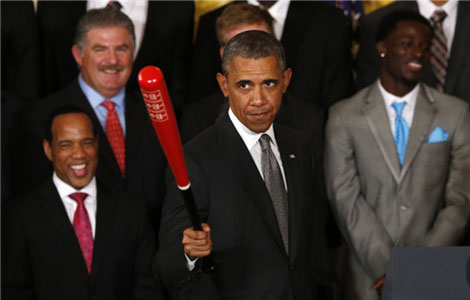New visas to boost family reunions
Updated: 2013-07-23 23:34
By ZHAO YINAN in Beijing and CHEN JIA in San Francisco (China Daily)
|
||||||||
Process reformed and revamped
Relatives of foreign residents in China will soon have more opportunities to visit their loved ones, thanks to new visa rules announced on Monday.
Under regulations from the Legislative Affairs Office of the State Council, an S visa will be created for family members of professionals from overseas.
Spouses, young children, parents and parents-in-law will all qualify for the visa when the regulations take effect in September, authorities said. S1 visas will allow a stay of more than six months, while S2 visas will be for shorter visits.
No details about S2 visa applications were announced, but experts said having a new category for foreign expatriates' relatives will make applications more convenient and easier.
Under existing rules, foreigners arriving in China for family reunions can only apply for an L visa.
Wang Huiyao, director-general of the Center for China and Globalization, an independent, non-profit think tank in Beijing, said he believes the new move will help attract and retain international expertise.
The Legislative Affairs Office said in a statement: "Foreigners holding an L visa could be coming for tourism, family reunions or personal affairs. That visa category doesn't precisely correspond to the purpose of a visit."
The office said it has subdivided visa categories to more accurately state the reason for travel, adding that it hopes the regulations can deepen China's opening-up, boost tourism and attract more overseas talent.
The number of foreigners entering and leaving China has increased at an average rate of 10 percent annually since 2000, reaching 54.3 million last year, according to the Ministry of Public Security.
By the end of 2011, 4,752 foreigners had been granted permanent residency. Among them, more than 1,700 green card holders are overseas professionals working in China, and the rest are family members who have come to be reunited with them.
Arthur Glauser, 33, a teacher at an international school in Tianjin has worked in the city for four years. He and his Chinese wife have a child.
Glauser said his parents have never had a chance to visit his home in China and that he has no immediate plans to leave.
"It would be lovely to have my parents spend a little time with their grandson," he said.
He said family reunions will be an issue for an increasing number of foreigners in coming years, as China is wooing overseas experts and many foreigners are looking at opportunities in the country.
Glauser said he believes more people will consider settling down in China, but they will all face the same dilemma of how to balance life far away from home.
Liu Guofu, an immigration law professor at Beijing Institute of Technology, said the government has shown its sincerity toward global talent with the new policy.
"People being allowed to apply for S visas include the parents and parents-in-law of foreigners, which is much more generous than the international standard, which limits this to only a spouse and children," he said.
"The policy will benefit many foreigners, making their lives much easier and more comfortable, so that they can work in the country for a longer period."
But he said the change will bring challenges in the handling of foreigners, adding, "There are many other ways to attract talent and create a friendly environment for these professionals."
Liu does not think the government needs to go beyond international convention, which only allows for a spouse and children to visit on a family reunion visa. "Public security authorities will face more pressure," he added.
Apart from the S visa, the regulations introduce another three categories.
These are an R visa for foreign experts whose skills are urgently needed in China, an M visa for visitors on trade and business missions, and a Q visa for families of Chinese citizens living abroad and foreigners with permanent residence in China.
"The liberalization of China's policy in granting visas is a positive development for a number of reasons. It is on the one hand an indication that China is increasingly integrated with other parts of the world in competing for talent and on the other hand that China is becoming an appealing place for skilled professionals to begin or build their careers," George Koo, an international business consultant and board member of New America Media, told China Daily in San Francisco.
"It is great to know there is a new visa policy because our family had a nephew who is working in Beijing right now," Maury Edelstein, a San Francisco citizen, told China Daily. "Though I am not sure how it would work at our convenience, it isn't a bad thing to have more choices."

 Death toll in Spain train crash rises to 56
Death toll in Spain train crash rises to 56
 Royal baby named George Alexander Louis
Royal baby named George Alexander Louis
 'The Grandmaster' takes center stage
'The Grandmaster' takes center stage
 Fewer Chinese consumers picking Apple's iPhone
Fewer Chinese consumers picking Apple's iPhone
 Yuan: Financial capitals vying for top spot
Yuan: Financial capitals vying for top spot
 Little princes and princesses
Little princes and princesses
 Obama lauds Louisville in White House visit
Obama lauds Louisville in White House visit
 PLA special forces hold military contest
PLA special forces hold military contest
Most Viewed
Editor's Picks

|

|

|

|

|

|
Today's Top News
The cost of being an expat just keeps going up
New US consulate offers quicker service
Bo indicted for bribery, corruption and power abuse
Snowden's hopes of leaving airport dashed
US extends review of Shuanghui, Smithfield merger
'Few hundred' at Manila anti-China rally
Obama, Congress both losing public support
Smithfield deal will get 2nd vetting
US Weekly

|

|






